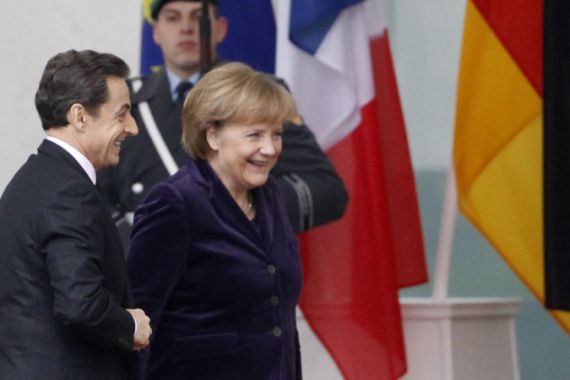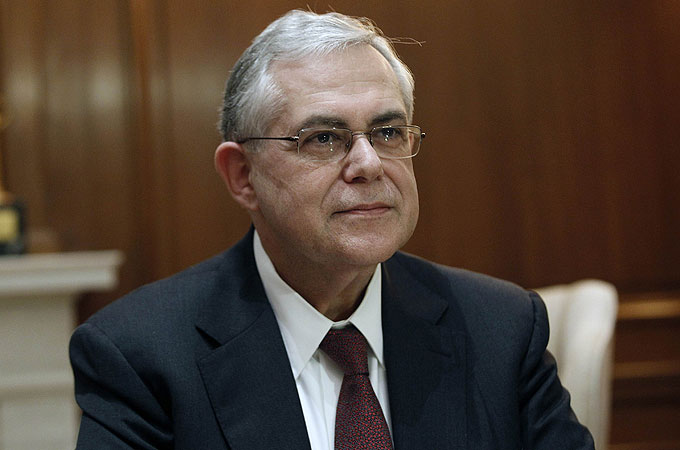Leaders gather for eurozone crisis summit
Greek debt deal still up in the air as EU leaders meet in Brussels to discuss ways to promote growth and create jobs.

 |
| Greek PM Lucas Papademos has been holding talks with private investors to clinch debt-swap deal [Reuters] |
European leaders are meeting in Brussels, the Belgian capital and de facto capital of the European Union, for a fresh round of talks aimed at tackling the eurozone debt crisis, with Greece’s precarious financial future at the top of the agenda.
Monday’s summit aims to finalise a budget treaty that will ensure closer co-ordination among the 17-member eurozone countries that use the single currency, as well as focusing on initiatives, pushed by France and Germany, to promote growth and job creation.
Keep reading
list of 4 itemsBehind India’s Manipur conflict: A tale of drugs, armed groups and politics
China’s economy beats expectations, growing 5.3 percent in first quarter
Inside the pressures facing Quebec’s billion-dollar maple syrup industry
About 23 million people in the European Union are currently unemployed and tough budget cuts might further worsen the situation.
“As well as finalising the fiscal treaty, leaders at the summit will assess a separate Franco-German initiative for special measures to boost growth and job creation,” the London-based Financial Times newspaper, reported.
However, wrangling is likely to continue among EU countries over the exact policies to address the crisis after the Financial Times reported on Saturday that Germany had sought tougher conditions on any future Greece rescue package.
Greece responded by saying the reported German plan might impinge upon its sovereignty even as its talks with private creditors failed to bear any result on the debt-swap.
Private investors have been asked to take a 50 per cent “haircut” [loss] on their bond holdings in Greece with the aim of cutting the country’s debt to 120 per cent of gross domestic product by 2020.
‘Blunt warning’
Al Jazeera’s Jonah Hull, reporting from Brussels, said: “This leaked proposal, some say deliberately leaked, over the weekend has generated furious response from Athens. I don’t think they are in anyway interested in accepting these terms, one politician in Athens calling this a product of sick imagination.”
“The key thing, I think, is that it is a leaked proposal, it is not clear whether it will in fact become the formal proposal.
“It may have been designed to test waters or it may have been designed to deliver this incredibly blunt warning to Greece that it is effectively now or never.”
Our correspondent said, “The German finance minister using the words Greece “needs to decide” whether or not it wants to stay in eurozone amid concerns that this unelected technocratic government is struggling without political support across the parties to get to grips to the terms of the original bailout: cut public sector jobs, cut the deficit to recover unpaid taxes.”
“In essence the German proposal demands the following: Germany wants Greece to temporarily give up sovereignty over its taxation and spending decisions to an EU budget commissioner who would have veto powers over those decisions.
“As I say it is not clear, whether this proposal will be formally put, it seems unlikely.”
The Brussels summit coincides with a 24-hour general strike by Belgium’s three main unions throwing transport and public services out of gear in a protest against government austerity measures.
The unions served warning that efforts to reinvigorate the European economy should center on taxing multinationals instead of slashing public services and imposing a pension reform that forces people to work longer and cuts payments in some cases.
European stocks fall
European shares fell on Monday before the start of the summit as suspense over Greece debt-swap talks continued.
Greece has to strike a deal with the private investors to be able to get the next tranche of IMF-EU loan of worth $172bn in order to avoid default on its loans.
Banking stocks, many of which have exposure to eurozone peripheral debt, were the worst performers, with the STOXX Europe 600 Banks index down 1.6 per cent.
“It is all pretty negative, Greece is still trying to get a deal and there are worries about contagion,” said Joe Rundle, head of trading at ETX Capital.
“Eurozone leaders still need to come up with a solution and all the negative news is not good for consumer confidence and could lead to a snowball effect, spending could slow down and hit company earnings.”
At 0805 GMT, the FTSEurofirst 300 index of top European shares was down 0.6 per cent at 1,034.16 points.